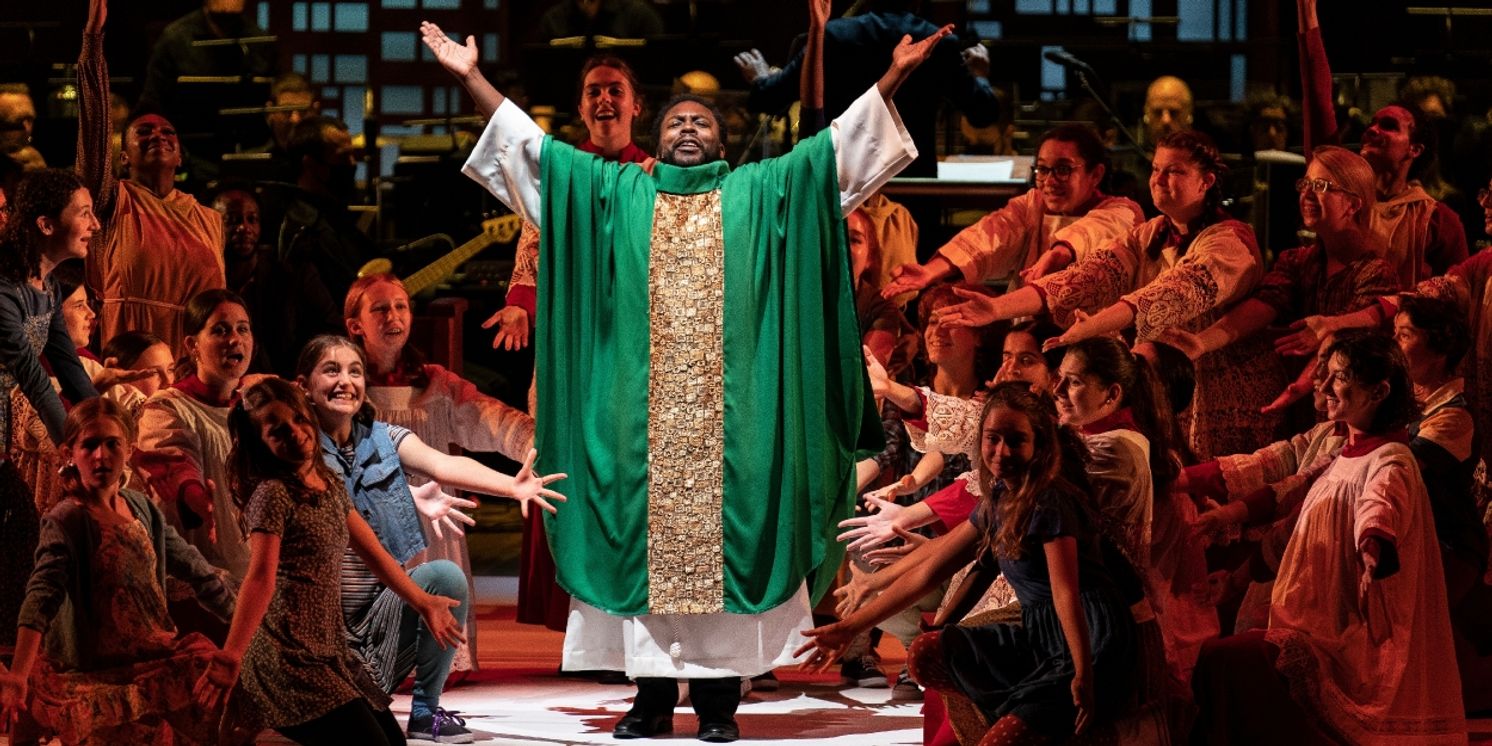Review: LEONARD BERNSTEIN'S 'MASS' at the Kennedy Center
This elaborate National Symphony Orchestra production runs through Sunday, September 18 in the Kennedy Center's Concert Hall

Leonard Bernstein's Mass is no one's sentimental favorite. The "Theatre Piece for Singers, Players and Dancers," commissioned by Jacqueline Kennedy for the 1971 opening of the Kennedy Center, is a mad and maddening, flawed but hugely ambitious ecclesiastical fever dream. It's an iconoclastic overgrown beautiful mess, and you should experience it if you can.
It has a complicated orchestration, adult and children's choirs, operatic and theater-style vocalists, pre-recorded segments, and a troupe of dancers. Despairing not just over war and environmental degradation but also pretension and sanctimony, it is sometimes more than a little pretentious and sanctimonious itself. The current Kennedy Center version has 210 performers, but stripped down to its essence, the work depicts a priestly figure called the Celebrant experiencing an existential crisis of faith in the form of a dissociative mental breakdown. The depths are embodied -- or perhaps disembodied -- in a shattered chalice. The Catholic Church blasted the work and then years later embraced it. That combined reaction seems like the right one -- a love-hate response to a love-hate Mass that is at once mocking, maudlin, and devotional.
The chain-smoking Bernstein's own psychic state may not have been so distant from the Celebrant's. Deadline pressures around his mountain of composing, conducting, piano-performance, and media projects; vilification by the Nixonian right for his anti-war views; angst after the Kennedy and King assassinations; and tumult in his personal life couldn't have lent themselves to tranquility. In that light, unfiltered as it was, with Bernstein's finishing the score even after rehearsals began, Mass might be seen as a cacophonous, chaotic self-portrait.
In quality, it is almost comically uneven. During 17 sections that can be further divided into 32, the music is a thick postmodern stew of genres. Baroque, late-Romantic, modern, twelve-tone, Broadway, jazz, pop, rock-opera, gospel, and circus elements all have their under-edited say.
One hears plainly the heavy influences of Godspell, Jesus Christ Superstar, and Hair, a brief jaunty phrase snatched almost whole-cloth from Bizet's Carmen Suite, and strong echoes of Bernstein's own theater music and religious choral work. At times, the mood and mallet-percussion is so reminiscent of West Side Story that a listener half expects to see Riff and Bernardo duking it out over the Eucharist.
The libretto is a mix of Latin, Hebrew, and English, holy passages mixed with juvenile singsong, jaded rhymes, and a bit of trilingual, punning semi-gibberish as the Celebrant loses his marbles. Steven Schwartz contributed to the lyrics as did -- for a few of the piece's most memorable lines -- an uncredited Paul Simon.
Can any creative team make coherent sense of all this? Amazingly, yes.
In a 51st-anniversary production, the Kennedy Center's National Symphony Orchestra collaborates with the Heritage Signature Chorale and the Children's Chorus of Washington all under the direction of Alison Moritz and the lively baton of James Gaffigan. Hope Boykin's choreography gives the proceedings swooping, swaying kinetics.
Moritz shapes the tale decisively around the Celebrant's soul-sickness, with the more than two dozen soloists and dancers forefronting the expanded orchestra in pews that might also be read as a kind of spiritual transit station. The sense is of a restless, teeming humanity galaxy-spiraling around the Celebrant in shifting joy, doubt, and a quest for big answers to the riddles of existence.
The audience is invited into the ritual from the start. As cast members stroll the Concert Hall's aisles toward the stage, lighting and scenic designer Aaron M. Copp bathes listeners in a yellow-pink daylight glow, as if we are in God's greenhouse during Creation. Costume designer Lynly A. Saunders mixes holy vestments of both ornate and humble varieties with street clothes, furthering our sense of timelessness, the breadth of humanity, the animal nature of liturgical hierarchy and the off-and-on dignity of our curious beast natures. Conductor Gaffigan brings out the vivid colors of Bernstein's over-the-top instrumentation, with an especially vigorous percussion section providing splendid momentum.
All this would come to naught, however, were it not for the sterling performance of Will Liverman as the Celebrant. He shifts movingly from his deep, resonant baritone to delicate falsetto. He complements vocal virtuosity with fine acting and body language. One moment he is a festive, commanding priest. Another, he slumps woefully onto a pew like a tired vagrant. He beseeches, comforts, cries out to his congregants. When his mind overheats, he bounds up a stairway and ridicules the conductor, casting mockery upon mockery, questioning the meaning and power of art itself in a hall, on an occasion, that treats art worshipfully.
Is all lost, then?
No -- or at least we hope not. Bernstein hoped not.
The Mass draws upon a traditional Catholic Mass, but it also draws upon the masses. When the Celebrant loses the spirit of worship, the masses rebuild their faith upon the pure high simple voices of children. The work tricks and cajoles us as only Bernstein could. It kneads its obvious faults into the fresh dough of its ultimately sweet, earnest intent. It ends with the regular everyday people singing simply, quietly amid the echoes of the thunderous storm of doubt. They sweep up the shadowed shards of the chalice and look up and around themselves, in search of their better natures.
Photograph by Scott Suchman
Run time: two hours with no intermission
Reader Reviews
Videos

